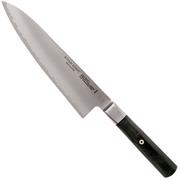

You have an outdated webbrowser. The website might not work correctly.
Gyutos are versatile kitchen knives for everyday cutting tasks. The gyuto is the Japanese version of the European chef's knife The shape of the blade is perfect for chefs who cut with a rocking motion. This technique is also known as 'rock chopping'. The main difference between a European chef's knife and a gyuto is that a gyuto generally does not have a bolster that extends into the heel of the knife. The bolster is the thick, metal part between the handle and the blade. At Knivesandtools, you will find gyutos from brands such as Sakai Takayuki, Tojiro, Miyabi, Kai and Eden.
In contrast to a European chef's knife, a gyuto generally does not have a bolster. This has some advantages: the knife is more lightweight, you can use the entire edge of the knife when cutting, and sharpening your knife is much easier.
Of course, we only sell good gyuto knives, so choose the one you like best. However, we do have some tips to help you find the one that's perfect for you.
Like with any chef's knife, it's important to consider the length of the blade. On average, an all-purpose gyuto has a blade length of about 20 cm. If your hands are a smaller than average, it might be worth looking into smaller gyutos. Maybe between 16 and 18 cm. Similarly, do you have bigger hands? Or do you regularly cut big ingredients like an entire cabbage? Then it might be worth choosing a 23 to 24 cm blade length.
A gyuto made from stainless steel does not require a lot of maintenance, except for some sharpening now and then. Simply wash by hand, dry well and you're done. You can also choose for the more traditional option: carbon steel. It's not stainless, but it's very tough and can be sharpened to razor-sharpness. One drawback is that 'not stainless' really means 'not stainless': If you leave the knife to wash after dinner, the blade may already be very discoloured.